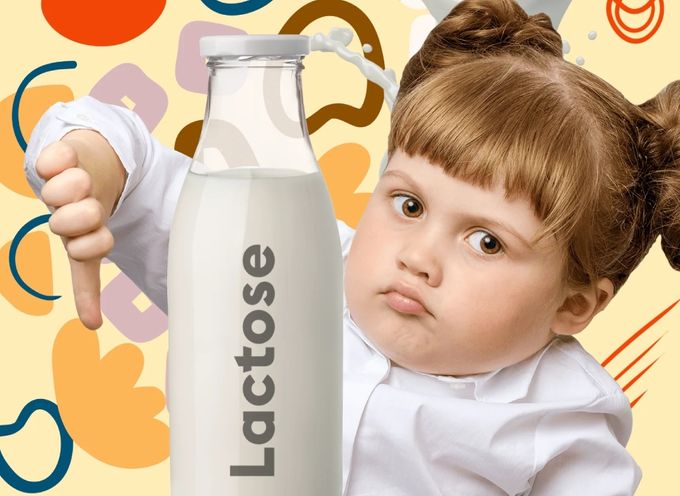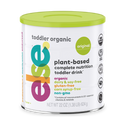Understanding Cow’s Milk Intolerances and Sensitivities in Kids
Explore why Else plant-based nutrition is perfect for kids with cow's milk intolerances and sensitivities. Discover its health benefits, clean and natural ingredients, and how it provides balanced nutrition to support your child's growth.
Published July 2, 2024

Cow's milk has been a staple in diets worldwide for generations, but many kids have sensitivities to it—some react with allergies, while others face digestive issues. This can be challenging for parents who want to provide their child with essential nutrients like calcium and protein but struggle to find the right milk alternative among the overwhelming options available.
» Discover dairy-free, plant-powered whole nutrition for healthy growth
Types of Milk Intolerances
Cow’s Milk Protein Allergy (CMPA)
The World Allergy Organization estimates that 0.25-4.9% of children have a cow’s milk protein allergy (CMPA) (source). Other authorities estimate the prevalence of a cow’s milk allergy to be 2-3% for children under the age of three (source).
» Here's why you should consider dairy-free formula
When a child is allergic to either the casein or whey in milk, he or she can experience a variety of milk allergy symptoms.
- In mild cases, only hives and “throat itching” occur.
- Moderate allergic symptoms involve facial or tongue swelling, wheezing, throat tightness, vomiting, and diarrhea.
- An anaphylactic reaction is life-threatening and may be characterized by hypotension and a loss of consciousness.
Any of these milk allergy symptoms can progress rapidly, so prompt emergency treatment and evaluation is necessary. To prevent these reactions, cow’s milk must be avoided.
» Check out these cow’s milk protein alternatives
Eosinophilic Esophagitis (EE)
Another type of severe allergic reaction to milk is eosinophilic esophagitis (EE). While a variety of foods can trigger this condition, milk is one of the most common irritants. Unlike the histamine-mediated reaction seen in CMPA, symptoms of EE are due to irritation of the esophagus from an increased amount of eosinophils. This inflammation presents as difficulty swallowing or gagging but may be severe enough to cause an esophageal stricture (source).
Elimination diets are typically recommended to both diagnose and treat this condition. Children often require a liquid elemental diet, sometimes for years, until the inflammation resolves.
» Discover signs and symptoms of milk allergy in babies
Lactose Intolerance
Lactose is the natural sugar found in cow's milk, and it requires the lactase enzyme for proper digestion. This enzyme helps break down lactose, making it easier for the body to absorb nutrients from milk. It's like having a special helper in your child's tummy to make sure they can enjoy their milk without any tummy troubles. There are four classifications of lactose intolerance:
- Developmental: Seen in premature infants under 34 weeks gestation
- Congenital: A rare autosomal recessive disorder in the Finnish population
- Lactase Non-Persistence: Childhood-onset, typically at age 5
- Secondary/Temporary: Seen in intestinal disorders or infections
The majority of childhood cases are of the lactase non-persistent type. Unabsorbed intestinal lactose can cause abdominal pain, bloating, flatulence, and diarrhea. These symptoms are prevented by taking a lactase supplement prior to dairy consumption or by avoiding dairy products altogether.
» Uncover signs your toddler might be lactose intolerant
Clinical Correlations
One concern for children who are unable to consume cow’s milk is the risk of calcium and vitamin D deficiencies.
» Discover a healthy alternative for infants with CMPA
Parents often use one of the increasingly popular milk substitutes, such as soy milk products that are now competing with those made from nuts, grains, hemp, and peas. However, the true nutritional value of such products has been debated.
In a comparison study, it was discovered that vitamin fortification was necessary to increase the nutritional value of these kinds of milk (source). Not every alternative milk included vitamin D, which is necessary for bone calcium absorption, and soy milk was the only option with enough fat for toddler brain myelination.
» Explore plant-powered, dairy-free nutrition for sensitive tummies
Else: Solution For a Growing Problem
The rise in children's food allergies and intolerances highlights the need for quality alternatives like Else. Our innovative plant-powered formula, free from cow's milk components, is made from almonds, buckwheat, and tapioca and is rich in protein, vitamin E, and healthy fats.
What's more, Else's formula is fortified with essential nutrients, including calcium and vitamin D, and contains significantly less sugar, making it especially beneficial for children with cow's milk intolerance.
The content and advice provided in this article are for informational purposes only and are not a substitute for medical diagnosis, treatment, or advice for specific medical conditions. Always consult a pediatrician to understand the individual needs of your child.











